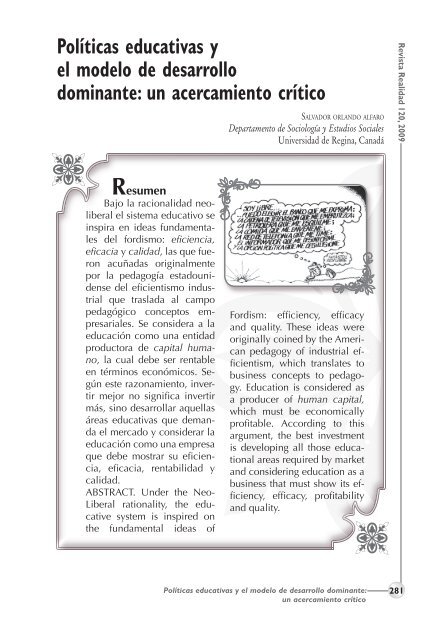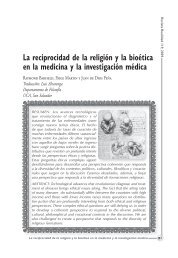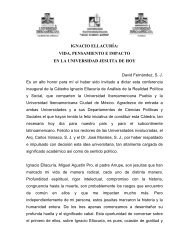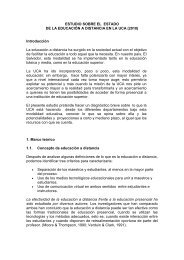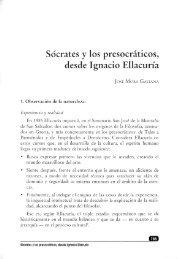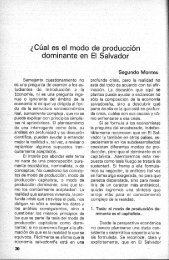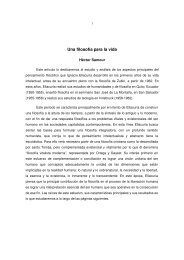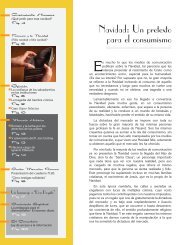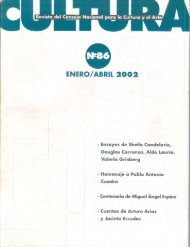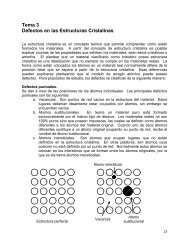Políticas educativas y el modelo de desarrollo dominante: un ...
Políticas educativas y el modelo de desarrollo dominante: un ...
Políticas educativas y el modelo de desarrollo dominante: un ...
You also want an ePaper? Increase the reach of your titles
YUMPU automatically turns print PDFs into web optimized ePapers that Google loves.
<strong>Políticas</strong> <strong>educativas</strong> y<br />
<strong>el</strong> mod<strong>el</strong>o <strong>de</strong> <strong>de</strong>sarrollo<br />
<strong>dominante</strong>: <strong>un</strong> acercamiento crítico<br />
<br />
<br />
<br />
<br />
<br />
<br />
<br />
<br />
<br />
<br />
<br />
<br />
<br />
<br />
<br />
<br />
<br />
<br />
<br />
<br />
<br />
<br />
<br />
<br />
<br />
<br />
<br />
<br />
<br />
SALVADOR ORLANDO ALFARO<br />
Departamento <strong>de</strong> Sociología y Estudios Sociales<br />
Universidad <strong>de</strong> Regina, Canadá<br />
<br />
<br />
<br />
<br />
<br />
<br />
<br />
<br />
<br />
<br />
<br />
<br />
<br />
<br />
<br />
<br />
<br />
<strong>Políticas</strong> <strong>educativas</strong> y <strong>el</strong> mod<strong>el</strong>o <strong>de</strong> <strong>de</strong>sarrollo <strong>dominante</strong>:<br />
<strong>un</strong> acercamiento crítico<br />
281<br />
Revista Realidad 120, 2009
Revista Realidad 120, 2009<br />
282<br />
<br />
<br />
<br />
<br />
<br />
<br />
<br />
<br />
<br />
<br />
<br />
<br />
<br />
<br />
<br />
<br />
<br />
<br />
<br />
<br />
<br />
<br />
<br />
<br />
<br />
<br />
<br />
<br />
<br />
<br />
<br />
<br />
<br />
<br />
<br />
<br />
<br />
<strong>Políticas</strong> <strong>educativas</strong> y <strong>el</strong> mod<strong>el</strong>o <strong>de</strong> <strong>de</strong>sarrollo <strong>dominante</strong>:<br />
<strong>un</strong> acercamiento crítico
<strong>Políticas</strong> <strong>educativas</strong> y <strong>el</strong> mod<strong>el</strong>o <strong>de</strong> <strong>de</strong>sarrollo <strong>dominante</strong>:<br />
<strong>un</strong> acercamiento crítico<br />
283<br />
Revista Realidad 120, 2009
Revista Realidad 120, 2009<br />
284<br />
<br />
<br />
<br />
<br />
<br />
<br />
<br />
<br />
<br />
<br />
<br />
<br />
<br />
<br />
<br />
<br />
<br />
<br />
<br />
<br />
<br />
<br />
<br />
<br />
<br />
<br />
<br />
<br />
<br />
<br />
<br />
<br />
<br />
<br />
<br />
<br />
<br />
<br />
<br />
<br />
<br />
<br />
<strong>Políticas</strong> <strong>educativas</strong> y <strong>el</strong> mod<strong>el</strong>o <strong>de</strong> <strong>de</strong>sarrollo <strong>dominante</strong>:<br />
<strong>un</strong> acercamiento crítico
<strong>Políticas</strong> <strong>educativas</strong> y <strong>el</strong> mod<strong>el</strong>o <strong>de</strong> <strong>de</strong>sarrollo <strong>dominante</strong>:<br />
<strong>un</strong> acercamiento crítico<br />
285<br />
Revista Realidad 120, 2009
Revista Realidad 120, 2009<br />
286<br />
<br />
<br />
<br />
<br />
<br />
<br />
<br />
<br />
<br />
<br />
<br />
<br />
<br />
<br />
<br />
<br />
<br />
<br />
<br />
<br />
<br />
<br />
<br />
<br />
<br />
<br />
<br />
<br />
<br />
<br />
<br />
<br />
<br />
<br />
<br />
<br />
<br />
<br />
<br />
<br />
<br />
<strong>Políticas</strong> <strong>educativas</strong> y <strong>el</strong> mod<strong>el</strong>o <strong>de</strong> <strong>de</strong>sarrollo <strong>dominante</strong>:<br />
<strong>un</strong> acercamiento crítico
<strong>Políticas</strong> <strong>educativas</strong> y <strong>el</strong> mod<strong>el</strong>o <strong>de</strong> <strong>de</strong>sarrollo <strong>dominante</strong>:<br />
<strong>un</strong> acercamiento crítico<br />
287<br />
Revista Realidad 120, 2009
Revista Realidad 120, 2009<br />
288<br />
<br />
<br />
<br />
<br />
<br />
<br />
<br />
<br />
<br />
<br />
<br />
<br />
<br />
<br />
<br />
<br />
<br />
<br />
<br />
<br />
<br />
<br />
<br />
<br />
<br />
<br />
<br />
<br />
<br />
<br />
<br />
<br />
<br />
<br />
<br />
<br />
<br />
<br />
<br />
<br />
<br />
<strong>Políticas</strong> <strong>educativas</strong> y <strong>el</strong> mod<strong>el</strong>o <strong>de</strong> <strong>de</strong>sarrollo <strong>dominante</strong>:<br />
<strong>un</strong> acercamiento crítico
<strong>Políticas</strong> <strong>educativas</strong> y <strong>el</strong> mod<strong>el</strong>o <strong>de</strong> <strong>de</strong>sarrollo <strong>dominante</strong>:<br />
<strong>un</strong> acercamiento crítico<br />
289<br />
Revista Realidad 120, 2009
Revista Realidad 120, 2009<br />
290<br />
<br />
<br />
<br />
<br />
<br />
<br />
<br />
<br />
<br />
<br />
<br />
<br />
<br />
<br />
<br />
<br />
<br />
<br />
<br />
<br />
<br />
<br />
<br />
<br />
<br />
<br />
<br />
<br />
<br />
<br />
<br />
<br />
<br />
<br />
<br />
<br />
<br />
<strong>Políticas</strong> <strong>educativas</strong> y <strong>el</strong> mod<strong>el</strong>o <strong>de</strong> <strong>de</strong>sarrollo <strong>dominante</strong>:<br />
<strong>un</strong> acercamiento crítico
REFERENCIAS<br />
<br />
<br />
<br />
<br />
<br />
<br />
<br />
<br />
<br />
<br />
<br />
<br />
<br />
<br />
<br />
<br />
<br />
<br />
<br />
<br />
<br />
<br />
<br />
<br />
<br />
<br />
<br />
<br />
<br />
<br />
<br />
<br />
<br />
<br />
<br />
<br />
<br />
<br />
<br />
<br />
<br />
<br />
<br />
<br />
<br />
<br />
<br />
<br />
<strong>Políticas</strong> <strong>educativas</strong> y <strong>el</strong> mod<strong>el</strong>o <strong>de</strong> <strong>de</strong>sarrollo <strong>dominante</strong>:<br />
<strong>un</strong> acercamiento crítico<br />
291<br />
Revista Realidad 120, 2009
Revista Realidad 120, 2009<br />
292<br />
<br />
<br />
<br />
<br />
<br />
<br />
<br />
<br />
<br />
<br />
<br />
NOTAS<br />
1 Ambos economistas estado<strong>un</strong>i<strong>de</strong>nses<br />
se hicieron acreedores al Premio<br />
Nob<strong>el</strong> <strong>de</strong> Economía. Schultz en<br />
1979 y Becker en 1992.<br />
2 La economía <strong>de</strong> la educación concibe<br />
al <strong>de</strong>sarrollo económico <strong>de</strong> <strong>un</strong> país,<br />
como <strong>un</strong> proceso generalizado <strong>de</strong><br />
acumulación <strong>de</strong> capital físico y humano,<br />
don<strong>de</strong> la educación tiene <strong>un</strong> lugar<br />
muy importante, precisamente en la<br />
conformación d<strong>el</strong> capital humano.<br />
3 Agencias gubernamentales, f<strong>un</strong>daciones<br />
privadas, y organizaciones<br />
internacionales como <strong>el</strong> Banco M<strong>un</strong>dial,<br />
Fondo Monetario Internacional<br />
y otras participan en forma activa en<br />
la promoción d<strong>el</strong> capital humano. La<br />
teoría fue ampliamente dif<strong>un</strong>dida a<br />
través d<strong>el</strong> patrocinio <strong>de</strong> publicaciones,<br />
conferencias internacionales y<br />
<strong>Políticas</strong> <strong>educativas</strong> y <strong>el</strong> mod<strong>el</strong>o <strong>de</strong> <strong>de</strong>sarrollo <strong>dominante</strong>:<br />
<strong>un</strong> acercamiento crítico<br />
<br />
<br />
<br />
<br />
<br />
<br />
<br />
<br />
<br />
<br />
<br />
<br />
<br />
consultas con <strong>de</strong>stacados responsables<br />
<strong>de</strong> la planificación educativa.<br />
4 En la teoría <strong>de</strong> Schultz, que preten<strong>de</strong><br />
la <strong>un</strong>iversalidad <strong>de</strong> su teoría <strong>de</strong> capital<br />
humano, cuando obviamente está<br />
vinculada <strong>un</strong>a realidad concreta <strong>de</strong>terminada;<br />
es <strong>de</strong>cir, a <strong>de</strong>terminados<br />
parámetros, políticos, económicos y<br />
sociales. Don<strong>de</strong> no se han dado eso<br />
parámetros, como es en Latinoamérica,<br />
la teoría se vu<strong>el</strong>ve i<strong>de</strong>ología.<br />
5 El concepto <strong>de</strong> competencias surge<br />
en <strong>el</strong> ámbito <strong>de</strong> la psicología estado<strong>un</strong>i<strong>de</strong>nse<br />
<strong>de</strong> corte estructuralista<br />
vinculada a técnicas empresariales.<br />
La estructura básica d<strong>el</strong> mod<strong>el</strong>o <strong>de</strong><br />
competencias surgió d<strong>el</strong> Estudio <strong>de</strong><br />
la Motivación Humana <strong>de</strong> David<br />
McCll<strong>el</strong>and en los albores <strong>de</strong> la seg<strong>un</strong>da<br />
guerra m<strong>un</strong>dial.


